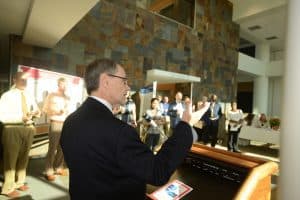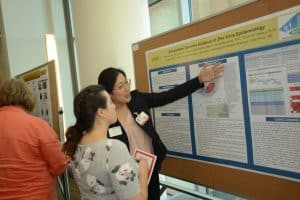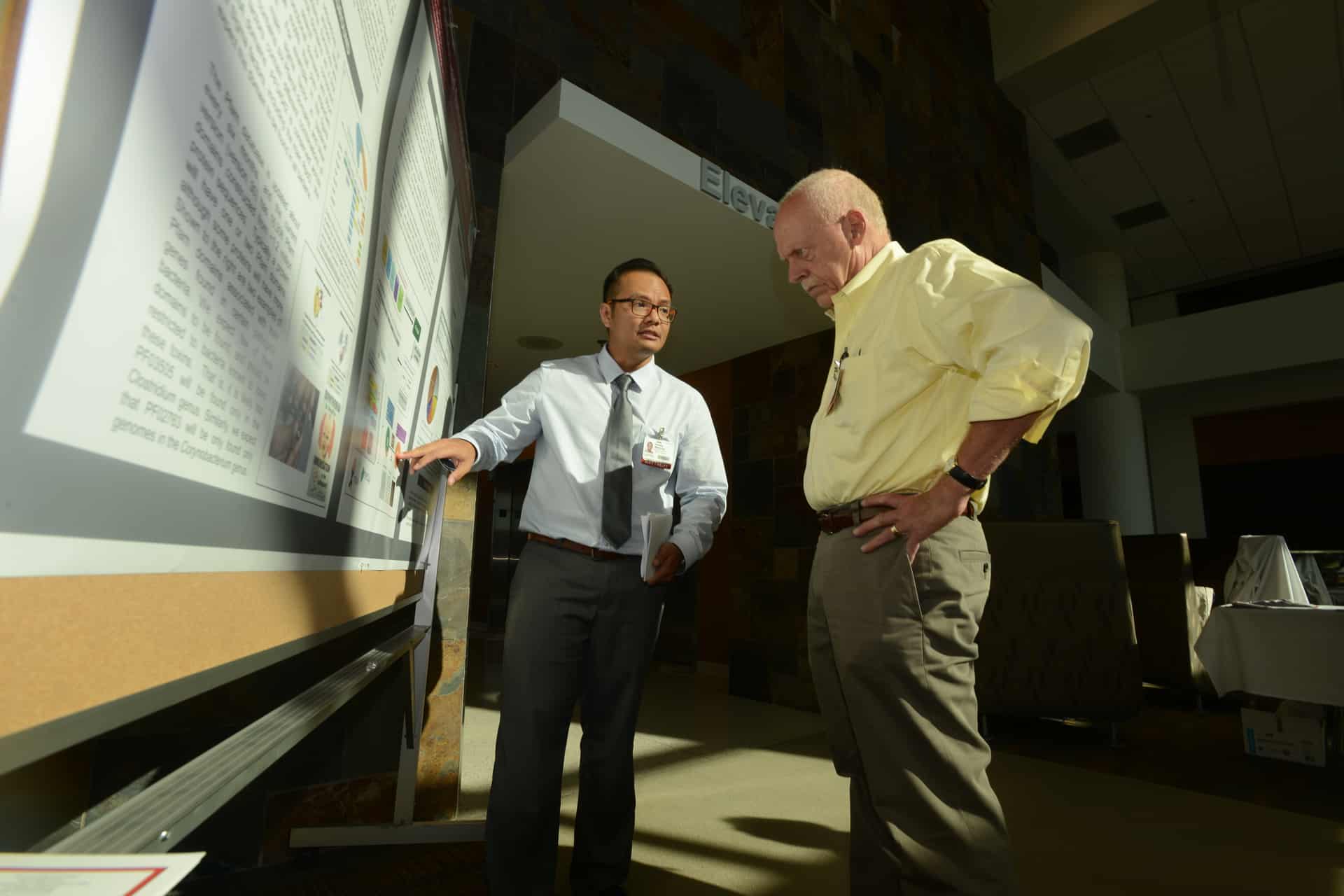Showcase Highlights Power of Biomedical Informatics
| Oct. 3, 2016 | Researchers from all disciplines can put the power of biomedical informatics to work for them, and the results of that collaborative spirit were on display at a recent reception at UAMS.
Fourteen research projects were featured at the Showcase of Medical Discoveries: Biomedical Informatics Research, held Sept. 21 at the UAMS Winthrop P. Rockefeller Cancer Institute. About 160 researchers, physicians, staff and students attended the event, which was the 15th in a series sponsored by the UAMS College of Medicine.
The interdisciplinary research topics highlighted the ability of the UAMS Department of Biomedical Informatics to provide researchers in a variety of fields with the latest computational tools for harnessing complex sets of medical and public health data.

Fred Prior, Ph.D., professor and chair of the Department of Biomedical Informatics in the UAMS College of Medicine, welcomes participants to the Showcase of Medical Discoveries: Biomedical Informatics Research.
“There is not a good understanding in our research community about what we do in biomedical informatics and how we might collaborate,” said Fred Prior, Ph.D., professor and chair of the Department of Biomedical Informatics in the UAMS College of Medicine. “So this is a wonderful way for us to show the breadth of how biomedical informatics can be used – from genes to population studies – and to invite our colleagues to come and talk about possible collaborations.”
Participants, like Mathias Brochhausen, Ph.D., associate professor of biomedical informatics, agreed.
“I think it’s important to show to potential users what computer science affords research,” Brochhausen said.
Brochhausen was on hand to present his project, SemanticSurvey – A Questionnaire Tool to Collect Semantically-rich Medical Data, in which he and his team developed an application that allows researchers and clinicians to more easily store and access information from surveys.
“In clinical trials, for example, it can be a problem,” Brochhausen said. “Traditional surveys just record the answer but they don’t capture what that answer means. We want to do something to immediately connect the answer with its meaning, which will make it more flexible in situations where the survey needs to change – which happens all the time in the research setting.”

Se-Ran Jun, Ph.D., assistant professor in the Department of Biomedical Informatics, explains her research on the zika virus.
Donald J. Johann Jr., M.D., associate professor of medicine and biomedical informatics in the College of Medicine Division of Hematology/Oncology, attended the event to present his team’s poster on Scientific and Methodological Advancements in Liquid Biopsies to Further the Development of Lung Cancer-based Precision Medicine.
Johann’s project includes using biomedical informatics technology to tackle the large and complex “big data” being generated by a five-university collaborative clinical trial studying precision medicine in lung cancer treatments.
“This involves the construction of very advanced bioinformatics,” Johann said. “For the success of the project, it is important for us to be able to manage the data, process the data, put it together, take it apart and watch it over time.”
The Showcase of Medical Discoveries is organized by the office of Vice Chancellor for Research Lawrence Cornett, Ph.D., and supported by UAMS College of Medicine Dean Pope L. Moseley, M.D. It originated from discussions about the faculty’s desire for more opportunities to display their scientific work in a social setting.
The biomedical informatics showcase was competitive, with organizers receiving more entries than could be displayed. The research projects highlighted at the showcase were:
- Applications of Molecular Dynamics to the Design of Radioprotectant Tocotrienols with Enhanced Bioavailability. Researchers: Cesar M. Compadre, Awantika Singh, Shraddha Thakkar, Guangrong Zheng, Philip J. Breen, Sanchita Ghosh, Mahmoud Kiaei, Marjan Boerma, Kottayil I. Varughese and Martin Hauer-Jensen
- Comparative Genomic Evidence of Zika Virus Epidemiology. Researchers: Se-Ran Jun, Intawat Nookaew and David Ussery
- Empowering Information-Driven Healthcare. Researchers: William Golden, Tyler Vodehnal and Marlo Harris
- SemanticSurvey – A Questionnaire Tool to Collect Semantically-rich Medical Data. Researchers: Joseph Utecht, John Judkins and Mathias Brochhausen
- Performance Evaluation for Gene Set Analysis Approaches for RNA-seq data. Researchers: Yasir Rahmatallah and Galina Glazko
- Geographic Variation in Diagnosed Chronic Medical Conditions in the Arkansas Medicare Population. Researchers: T. Mac Bird and Kenley Money
- Integrative Analysis of Microbiome and Metabolome of the Porcine Gut Reveals Diet-associated Interrelationships. Researchers: Sudeepa Bhattacharyya, Brian Piccolo, Kelly Mercer, Sree V Chintapalli, Kartik Shankar and Laxmi Yeruva
- Metaproteomics Data Processing Pipe-Line: Application to the Study of Function of Gut Microbiome in Chronic Kidney Disease. Researchers: B. Zybailov, Y. Rahmatallah, G. Glazko, S. Byrum, L. Orr, A. Tackett, S. Mackintosh, R. Edmondson, D. Keiffer, S. Adams, N. Viziri and J. Arthur
- Data Standardization for Regulatory Decision-Making: Development of Data Standards in Mental Health, Cardiology and Infectious Diseases. Researchers: Anita Walden and Meredith Zozus
- Comparison of the Accuracy of Whole Body FDG PET CT and Whole Body Diffusion Weighted MRI Imaging with Background Subtraction (DWIBS) in Multiple Myeloma. Researchers: Kristen Schemel, Rohan Samant, Leo Rasche, Amy Buros, Faith Davies and Thomas Eluvathingal
- Microbiomics: Linking Human Gut Microbiome with Human Health and Disease. Researchers: Intawat Nookaew, Visanu Wanchai, Preecha Pratumcharoenpol, Se-Ran Jun and David Ussery
- Scientific and Methodological Advancements in Liquid Biopsies to Further the Development of Lung Cancer-based Precision Medicine. Researchers: Donald J. Johann, Horacio Gomez-Acevedo, Erich Peterson, Jason Liem, Meei Liu, Kostas Arnaoutakis, Matt Steliga, Ikjae Shin, Dong Yoon and Laura Hutchins
- Monitoring a Changing Profession: Clinical Research Data Management. Researcher: Meredith Zozus
- What is Life? A Set of 500 Conserved Functional Domains. Researchers: Visanu Wanchai, Arvind Ramanathan, Intawat Nookaew, David Foutch, Preecha Pratumcharoenpol, Se-Ran Jun, Trudy Wassenaar, Mike Leuze and David W. Ussery
